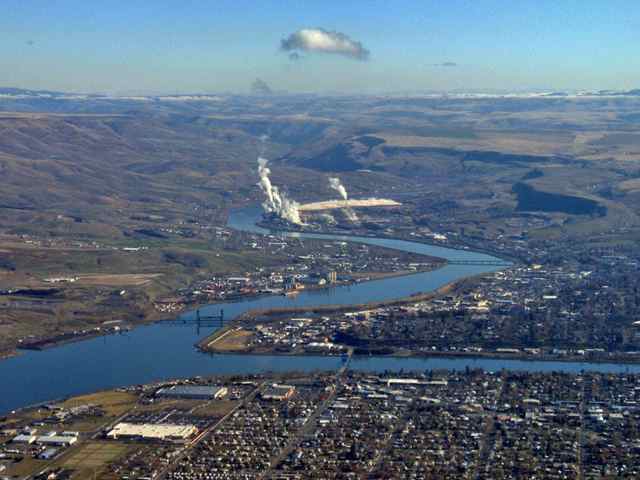forum
library
tutorial
contact

Dredging Plan Spawns Lawsuit
by Eric BarkerLewiston Tribune, November 25, 2014
|
the film forum library tutorial contact |

|
Dredging Plan Spawns Lawsuitby Eric BarkerLewiston Tribune, November 25, 2014 |
 Placing a target on the four lower Snake River dams and their influence on imperiled salmon, steelhead and lamprey, environmental groups and the Nez Perce Tribe filed a lawsuit Monday to stop planned dredging this winter of the Snake and Clearwater rivers near Lewiston.
Placing a target on the four lower Snake River dams and their influence on imperiled salmon, steelhead and lamprey, environmental groups and the Nez Perce Tribe filed a lawsuit Monday to stop planned dredging this winter of the Snake and Clearwater rivers near Lewiston.
The suit, filed in Seattle's federal District Court, claims the U.S. Army Corps of Engineers violated the National Environmental Policy Act and the Clean Water Act while preparing its plan to remove about 400,000 cubic yards of sediment from the navigation channel that makes barge transportation possible between Lewiston and Pasco.
The suit also alleges the agency failed to take a hard look at whether it is economically justifiable to maintain the river transportation system that has seen a dramatic decline in some cargo in recent years.
"The lower Snake River waterway exacts an enormous price from taxpayers as well as from wild salmon, steelhead and Pacific lamprey," said EarthJustice attorney Steve Mashuda. "The corps has failed to look at any alternatives to dredging this winter and fails to provide an honest assessment of the fiscal and environmental costs involved in shoring up this out-of-date waterway."
Mashuda represents several environmental and fishing groups, including Idaho Rivers United, Friends of the Clearwater, the Pacific Federation of Fisherman's Associations, the Sierra Club, Washington Wildlife Federation and Institute of Fisheries Resources. The suit was filed in conjunction with attorneys employed by the tribe.
The corps' Walla Walla District spent $16 millions to prepare the plan that was approved last week. It calls for spending another $6.7 million to carry out the dredging, scheduled to begin Dec. 15. The plan also includes a host of long-term measures such as sediment flushing, in-water mechanisms and levee raising, which can be used maintain the shipping channel and the capacity of the river to handle high flows.
The plan, more than 10 years in the making, has been attacked by salmon advocates for its potential effects on threatened or endangered anadromous fish and also for the expense to maintain it. Over the past two years, they have cast the lower Snake River as an inconsequential piece of the nation's river transportation system and a boondoggle to taxpayers.
"Dredging is not only fiscally irresponsible, it's bad for salmon, Pacific lamprey and other aquatic species," said Kevin Lewis, conservation director of Idaho Rivers United at Boise. "Instead of rushing to begin dredging in December, the Walla Walla District should take a step back and assess the sustainablility of the entire lower Snake River Project. The public deserves to know if these projects even pencil out."
The corps, port managers and farmers, the largest group using the river and its series of locks and dams, have said the expense is justified. The agency estimates about 3 million tons of commodities are shipped on the river each year and moving them by barge instead of truck or rail saves about $8.45 per ton or about $25 million per year. The agency also projects that it costs about $1 million to $5 million a year to maintain the shipping channel. Opponents claim the costs are much higher.
But the fight extends well beyond the merits of the river as a method of getting goods from the Lewiston-Clarkston Valley to ports of the lower Columbia River. Instead, the battle is over the future of the dams and wild salmon and steelhead runs. The dams, constructed from the 1950s to the 1970s, made Lewiston and Clarkston seaports and promised to bring economic development. But they also changed the nature of the rivers and caused a dramatic decline to fish that must contend with the dams and the slackwater behind them as they migrate to and from the ocean.
The suit does not include a request for temporary injunction that would delay the dredging while the case proceeds. Mashuda said an injunction could be filed later this week.
learn more on topics covered in the film
see the video
read the script
learn the songs
discussion forum
